You probably already know that smoking is detrimental to your health, but do you understand how deeply it affects your immune system? This complex network that's crucial for defending your body against harmful invaders takes a significant hit when you expose it to tobacco smoke. And it's not just the lungs that suffer—your whole body feels the impact.
Delving into the dangers of smoking can be both alarming and enlightening. From how smoking changes your immune system's structure to the diseases you're more prone to, it's essential to understand the full picture. Learn how quitting smoking can almost immediately start repairing the damage and boosting your defenses.
Armed with this knowledge, you can make informed decisions and take steps that could save your health. Whether you're a smoker or care about someone who is, understanding these relationships and knowing how to act can be a game-changer.
- Understanding the Immune System
- How Smoking Affects Immunity
- The Science Behind Smoking's Impact
- Diseases Linked to Smoking and Weakened Immunity
- Benefits of Quitting Smoking on Immune Health
- Practical Tips for Quitting Smoking
Understanding the Immune System
The immune system is an intricate network of cells, tissues, and organs that work together to defend the body against harmful invaders. Think of it like a highly sophisticated security system, always on the lookout for anything that doesn’t belong. When it detects such an invader, whether it’s a virus, bacterium, fungus, or parasite, the immune system mounts a defense to protect your body from illness and infection.
The primary components of the immune system include white blood cells, antibodies, the complement system, the lymphatic system, the spleen, the thymus, and the bone marrow. Each component has a crucial role in identifying and eliminating foreign substances. For instance, white blood cells act as the front-line fighters, ready to combat invaders directly. Antibodies are like detectives, identifying foreign substances and marking them for destruction.
The immune system is not a single entity, but a complex interaction of various parts of your body working together. – Dr. Anthony Fauci
The immune system also has two main types of responses: innate and adaptive. The innate response is the body's first line of defense and reacts quickly to invaders. The adaptive response, on the other hand, is more specialized and takes longer to develop. It ‘remembers’ previous encounters with pathogens, making future responses more efficient and effective.
Moreover, the immune system is responsive to various signals from within the body. It reacts to stress, sleep deprivation, and nutritional imbalances, all of which can either strengthen or weaken its function. This is why maintaining a healthy lifestyle is often stressed, as it directly contributes to the robustness of your immune defenses.
Considering the immune system's complexity, it’s not surprising that it can be significantly affected by external substances, like tobacco smoke. Smoking introduces a cocktail of chemicals into the body, which the immune system must then handle, often at the expense of its primary function—protecting you from real threats.
We’ll explore how smoking disrupts these crucial processes in the following sections, but for now, remember that a well-functioning immune system is fundamental to overall health and well-being. Just like a city relies on its security to keep its citizens safe, your body depends on its immune system to ward off illnesses.
How Smoking Affects Immunity
When you light up a cigarette, it's not just your lungs that take a hit. The harmful chemicals in tobacco smoke weave a tangled web of damage throughout your body, especially targeting your immune system. Let's break down the impact.
First, smoking introduces a myriad of toxins, including nicotine, carbon monoxide, and tar, into your bloodstream. These substances inhibit the function of immune cells, particularly T cells and B cells, which play crucial roles in identifying and neutralizing threats. The result? Your immune system becomes less efficient at fighting off infections and diseases.
One of the most direct ways smoking impairs immune function is by damaging the epithelial cells lining your respiratory tract. These cells serve as the first line of defense against airborne pathogens. When they're compromised, viruses and bacteria can invade more easily, leading to frequent respiratory infections. Smokers are particularly vulnerable to severe cases of flu and pneumonia compared to non-smokers.
The chronic inflammation triggered by smoking also wreaks havoc on your immune system. Inflammation is your body's way of dealing with injuries or infections, but smoking causes a constant state of low-grade inflammation. This persistent stress on the immune system exhausts it, making it less responsive to real threats. Long-term, smoking has been linked to autoimmune diseases, where the immune system mistakenly attacks healthy cells.
Let’s not forget the detrimental effect of smoking on the different organs involved in immune response. The spleen and lymph nodes, which act as hubs for immune activity, can also suffer. These organs help filter out harmful substances from the blood, but smoking reduces their efficiency, leaving you more susceptible to illness.
“Smoking shifts the balance of immune responses and impairs host defenses against infectious diseases,” says Dr. Anthony Fauci. His words encapsulate the grave reality smokers face. The harmful chemicals from cigarettes make the body less capable of fighting off viruses and bacteria, increasing the risk of illnesses ranging from the common cold to tuberculosis.
Interestingly, studies have shown that smoking can considerably decrease the effectiveness of vaccines. This is due to the weakened immune response, which doesn’t produce the necessary antibodies efficiently. Vaccines rely on a robust immune system to train it to recognize and combat specific pathogens, and smoking disrupts this crucial process.
So, what does all this mean on a practical level? If you're a smoker, you're not just playing with fire—you're inviting a host of health problems that can be avoided by kicking the habit. Understanding the detailed impact of smoking on your immune system is the first step towards making healthier choices. The data speaks for itself: quitting smoking can significantly bolster your immune defenses, helping you lead a healthier life.
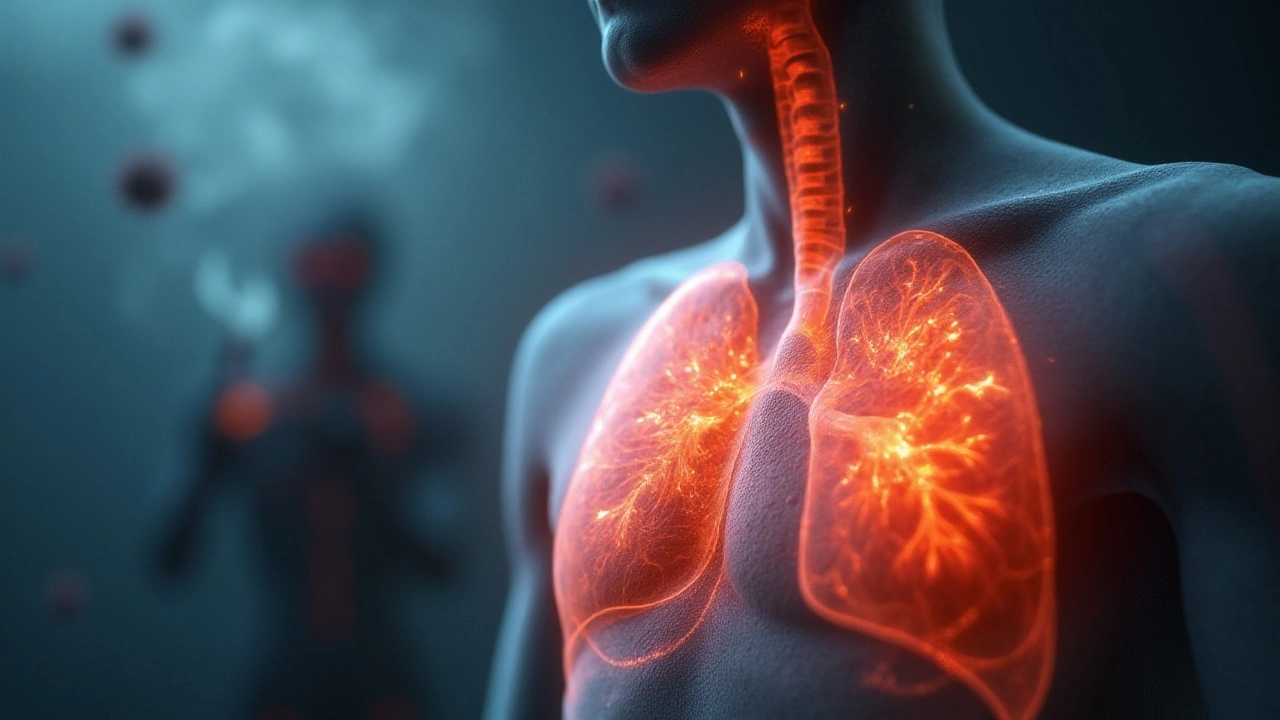
The Science Behind Smoking's Impact
Understanding how smoking damages your immune system starts with recognizing the toxic components in tobacco smoke. Cigarette smoke contains over 7,000 chemicals, many of which are poisonous. Among these are harmful substances like formaldehyde, benzene, and ammonia. These chemicals, when inhaled, introduce oxidative stress and inflammation, disrupting the immune system's normal functions.
The immune cells, such as macrophages and lymphocytes, are especially vulnerable to these toxins. Macrophages play a crucial role in devouring bacteria and dead cells, while lymphocytes are responsible for producing antibodies to fight off infections. When you smoke, these cells' efficiency is significantly reduced, creating a breeding ground for infections and diseases.
One particularly dangerous effect of smoking is its impact on cilia, the tiny hair-like structures in your respiratory tract. Cilia act as a first line of defense, catching and removing foreign particles like bacteria. Smoking damages these cilia, making it easier for pathogens to enter your lungs and cause respiratory infections. According to the Centers for Disease Control and Prevention (CDC), smokers are at a higher risk of developing chronic conditions such as bronchitis and pneumonia.
Additionally, smoking increases the levels of immunoglobulin E (IgE), an antibody kind that's often associated with allergic reactions. Higher IgE levels can set off an exaggerated immune response, leading to chronic inflammation. This inflammation can be detrimental, as it often affects tissues and organs long-term, making you more susceptible to autoimmune diseases and cancers.
"Smoking disrupts the function of immune cells, impairing the body's natural defenses," states Dr. Michael Siegel, a public health researcher.
Another troubling consequence of smoking is its effect on blood cells. Carbon monoxide, a major component of cigarette smoke, binds with hemoglobin more readily than oxygen does. This reduces the oxygen-carrying capacity of your blood, effectively starving your body and immune cells of the oxygen they need to function optimally. Over time, poor oxygenation can weaken your immunity and its ability to fend off infections.
Smoking's impact doesn't stop there. The habit also affects the thymus gland, an organ that produces T-cells, which are essential for the immune response. Research has shown that smokers have significantly fewer T-cells compared to non-smokers. A lower count of T-cells weakens the body's ability to recognize and destroy infected cells.
When you understand these mechanisms, it becomes clear why smoking is so harmful. By continually exposing your body to these toxins, you make it harder for your immune system to do its job, leaving you vulnerable to a range of ailments. Fortunately, quitting smoking can reverse some of these damages. Studies indicate that just ten years after quitting, the risk of lung cancer drops by half, and the risk of heart disease is similar to that of non-smokers. It's never too late to quit and start improving your health.
Diseases Linked to Smoking and Weakened Immunity
Smoking is notorious for causing a wide array of ailments, but did you know it has a profound effect on your immune system, making you more susceptible to various diseases? This combination is a recipe for disaster, impacting your overall health in ways you might not even realize. Let's explore the specific diseases that become a greater risk due to weakened immunity from smoking.
First and foremost, respiratory infections top the list. Smokers are much more likely to suffer from common colds, pneumonia, and chronic bronchitis. When you inhale tobacco smoke, you introduce thousands of harmful chemicals into your respiratory system. These chemicals weaken the natural barriers in your lungs that fend off infections. Studies have shown that smokers are more likely to suffer complications from influenza, and their symptoms are often more severe and last longer compared to non-smokers.
Chronic Obstructive Pulmonary Disease (COPD) is another major concern. COPD isn't just one disease but rather a group of conditions, including emphysema and chronic bronchitis. The chemicals in cigarette smoke cause the air sacs in your lungs to lose their elasticity, making it difficult to breathe. Over time, this leads to a persistent inflammation that further hinders your immune system's ability to respond to threats effectively. According to the World Health Organization, half of all smokers will eventually develop COPD if they don't quit.
Cardiovascular diseases are another serious concern. When your immune system is compromised by smoking, your risk of developing heart disease and stroke increases. The chemicals in tobacco smoke can cause the lining of your arteries to thicken and harden, leading to a buildup of plaque—a condition known as atherosclerosis. This makes it easier for blood clots to form, increasing your risk of heart attacks and strokes. A statistical study showed that smokers are twice as likely to suffer from heart disease compared to non-smokers.
"The evidence is clear: quitting smoking can have a significant positive impact on your immune system, reducing your risk of various serious diseases," says Dr. Michael Cho, a well-respected pulmonologist.In addition to respiratory and cardiovascular diseases, smokers are also at a higher risk for autoimmune diseases. Conditions like rheumatoid arthritis and Crohn's disease have been linked to smoking. These diseases occur when your immune system mistakenly attacks your body's own tissues. Smoking triggers chronic inflammation, which may cause or exacerbate these autoimmune responses. Multiple studies have pointed out that smokers are about twice as likely to develop rheumatoid arthritis as nonsmokers.
We can't overlook the increased risk of cancers. Smoking is a leading cause of many types of cancer, not just lung cancer. The list includes cancers of the mouth, throat, esophagus, pancreas, bladder, kidney, and even the cervix. The carcinogens in tobacco weaken your immune system's ability to fight off cancer cells, giving the disease an upper hand. According to the American Cancer Society, about 30% of all cancer deaths in the U.S. are caused by smoking.
Another often-overlooked consequence is the effect on wound healing and postoperative recovery. Smokers tend to recover more slowly from surgeries and injuries. This slower healing process is due to the reduced flow of oxygen-rich blood to injured tissues, coupled with a weakened immune response. Surgical patients who smoke have a higher rate of infections and complications, making recovery a longer and more challenging process.
In summary, the link between smoking and a weakened immune system is clear and compelling. From respiratory infections and chronic diseases to autoimmune disorders and cancer, the risks are manifold and serious. Quitting smoking not only restores some of your lost immune function but also reduces your risk of these life-threatening diseases.

Benefits of Quitting Smoking on Immune Health
When you quit smoking, the benefits for your immune system begin almost immediately. Within just a few days, you'll notice your sense of taste and smell improving. However, the real magic happens inside your body. The harmful chemicals in cigarettes start to clear from your bloodstream, which boosts the performance of your immune cells.
Take, for example, macrophages. These are a type of immune cell that engulfs and digests harmful particles. When you quit smoking, macrophages are no longer constantly bombarded with smoke-related toxins, so they become more efficient at their job. This leads to fewer infections and a quicker recovery time when you catch something.
But it doesn't stop there. The cilia in your respiratory tract, those tiny hair-like structures that trap and move mucus out of your lungs, start to regain their function. Improved cilia function means your respiratory system is better at expelling pathogens before they can cause an infection. This reduces your risk of common illnesses like colds and bronchitis, as well as more severe conditions like pneumonia.
An interesting fact is within just one month of quitting, your skin starts to improve as well. Smoking reduces blood flow which affects your skin's health, causing it to look dull and aged. As your circulation improves after quitting, your skin gets more oxygen and nutrients, making it look healthier and more vibrant.
Your white blood cell count also normalizes when you quit smoking. Chronic smoking keeps your white blood cells constantly activated, leading to wear and tear. When you quit, the inflammation in your body reduces, allowing your white cells to relax and respond more effectively when truly needed.
Quitting smoking has a *cumulative effect*. The longer you stay smoke-free, the more your immune system repairs itself, leading to a lower risk of chronic diseases. Statistics show that after five years of quitting, your risk of cancers related to smoking drops by half. This is a compelling reason to toss out that last pack of cigarettes.
Dr. Thomas Glynn, an expert from the American Cancer Society, states, “The human body's ability to heal itself from years of smoking is nothing short of remarkable. The sooner you quit, the better your immune system will function and the healthier you'll be.”
“The human body's ability to heal itself from years of smoking is nothing short of remarkable. The sooner you quit, the better your immune system will function and the healthier you'll be.” — Dr. Thomas Glynn, American Cancer Society
Let's not forget mental health. Smoking impacts not just your physical well-being but your mental state too. Anxiety and withdrawal are temporary but quitting reduces mental health issues in the long term. When you quit smoking, your stress levels decrease as your body reduces its dependency on nicotine. Happier, healthier, and stronger—there's no downside to quitting smoking when it comes to your immune health.
Practical Steps for Quitting Smoking
Here are some practical tips to help you quit smoking and improve your immune health:
- Plan Ahead: Set a quit date and prepare for it by removing all smoking accessories from your home and workspace.
- Seek Support: Join a support group or talk to friends and family about your decision. They can offer encouragement and hold you accountable.
- Use Aids: Consider nicotine replacement therapy or medications as prescribed by your healthcare provider.
- Stay Active: Physical activity can help reduce cravings and improve your mood.
- Stay Positive: Remind yourself of the benefits of quitting and visualize a healthier you.
- Avoid Triggers: Identify and avoid situations or places where you’re tempted to smoke.
Quitting smoking is a tough journey, but the benefits to your immune system and overall health make it worth the effort. The sooner you quit, the stronger and healthier you'll be.
Practical Tips for Quitting Smoking
Deciding to quit smoking can be one of the most significant steps for your health, particularly in improving your immune system. But how do you actually go about it? Here are some practical tips to help you quit for good. Start by setting a quit date. This gives you a clear target to aim for and allows you to plan for it. When the date arrives, throw away all cigarettes, lighters, and ashtrays. Clean your house and car to remove the smell of smoke, which can trigger cravings.
Next, anticipate and overcome withdrawal symptoms. Nicotine is incredibly addictive, and your body will crave it. You might feel irritable, anxious, or even depressed. To manage these feelings, consider nicotine replacement therapies like gum or patches. Avoid situations where you would typically smoke, like hanging out with other smokers or drinking alcohol. Find new ways to cope with stress, such as exercise, meditation, or talking to a friend.
Don't underestimate the power of support. Quitting smoking can feel like a lonely journey, but many people are rooting for you. Join a support group, either in person or online. Share your experience and gain strength from others going through the same struggle. Let your family and friends know about your decision, and ask them to help you stay accountable.
Stay busy to keep your mind off smoking. Pick up a hobby you’ve always wanted to try but never had time for, whether it’s painting, gardening, or playing a musical instrument. Physical activities like running or yoga can not only distract you but also improve your mood and health, making you feel less tempted to smoke.
Think about the benefits of quitting smoking. Better health, more money in your pocket, and a longer life are just a few of the rewards you'll enjoy. You’ll find it easier to be active, smell better, and have whiter teeth. Use these positives as motivation to keep going when times get tough.
Sometimes, quitting smoking might require medical intervention. Talk to your doctor about prescription medications that can help you quit. These drugs can reduce withdrawal symptoms and make it easier for you to stay on track. Counseling can also be incredibly effective. A professional can help you develop strategies to avoid relapse and deal with the psychological aspects of addiction.
According to the American Cancer Society, “Quitting smoking can add as much as 10 years to your life expectancy.”
Reward Yourself
Every milestone deserves a reward. Whether it’s one day, one week, or one month without smoking, celebrate your achievements. Treat yourself to something nice, like a fancy dinner or a small gift. These rewards will not only make you feel good but also reinforce your resolve to stay smoke-free.
Track your progress with a journal. Writing down your thoughts and challenges can provide insight into your smoking habits and help you develop better coping strategies. You’ll be able to see how far you've come and remind yourself why you embarked on this journey in the first place.
Finally, don’t be too hard on yourself if you slip up. Relapses are common, and what matters is that you keep trying. Learn from your mistakes, identify what triggered the slip, and make a plan to avoid it in the future. Remember, each attempt to quit brings you one step closer to achieving your goal of being smoke-free.

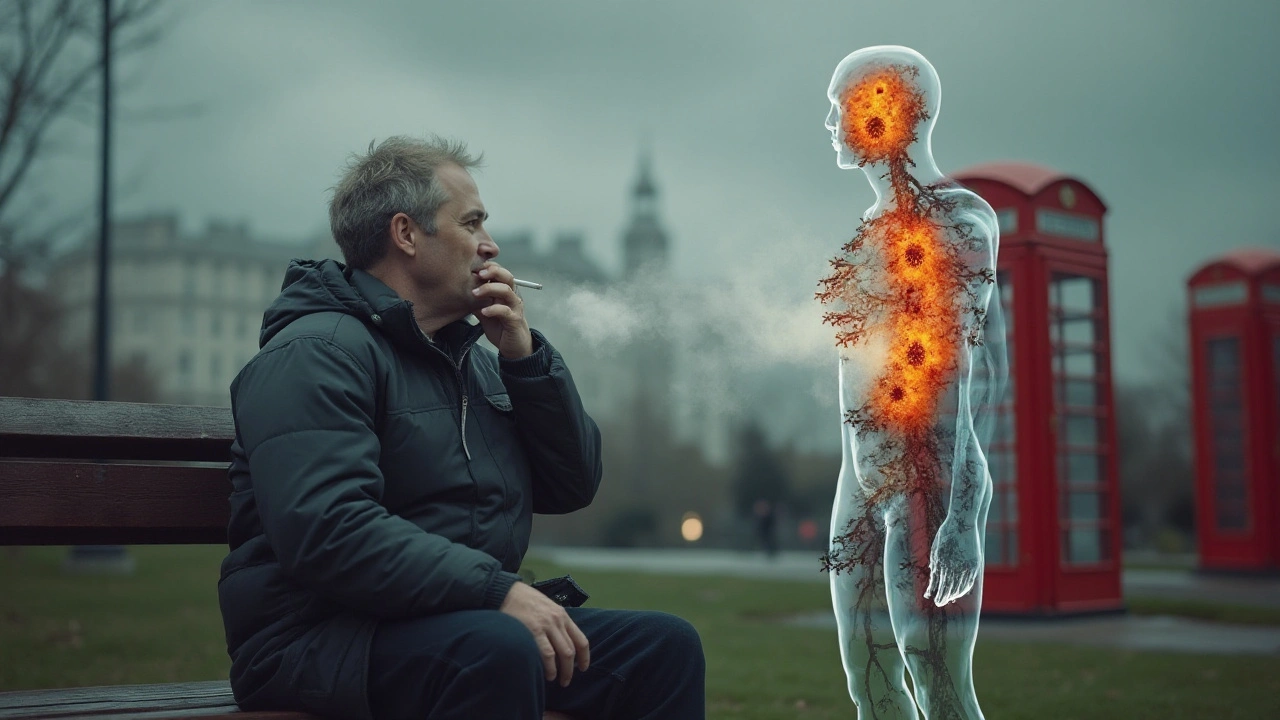

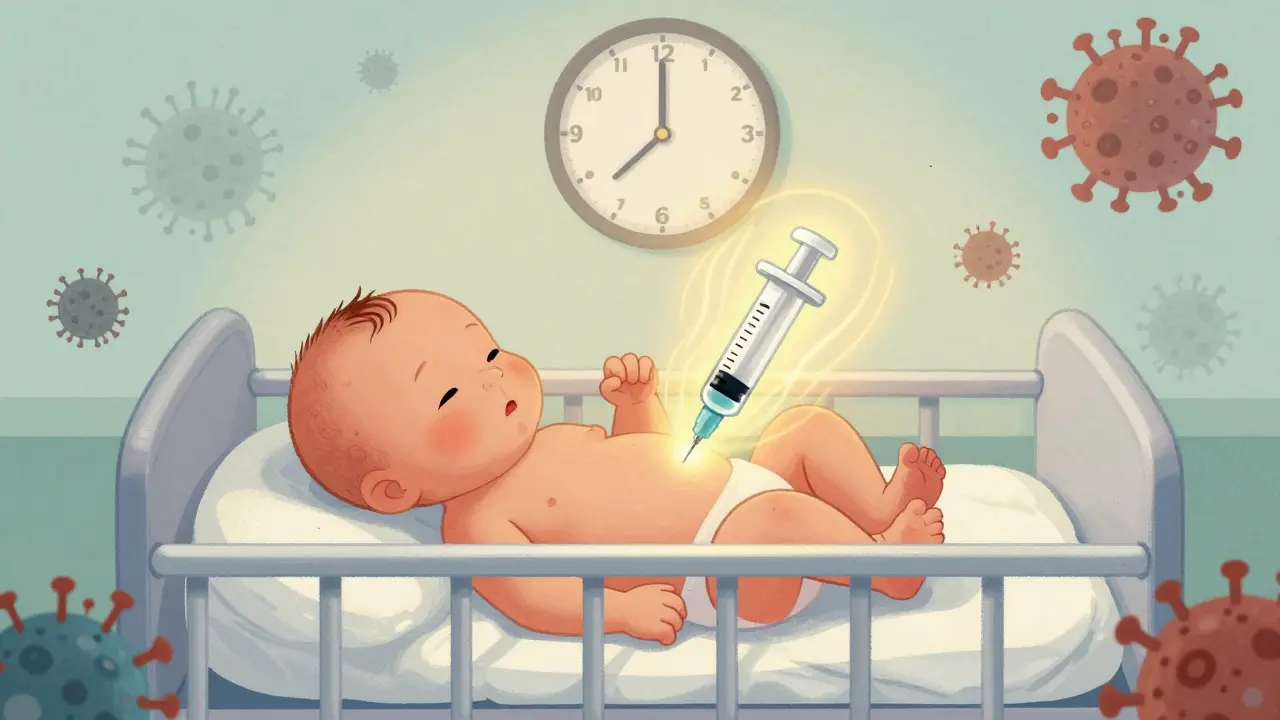
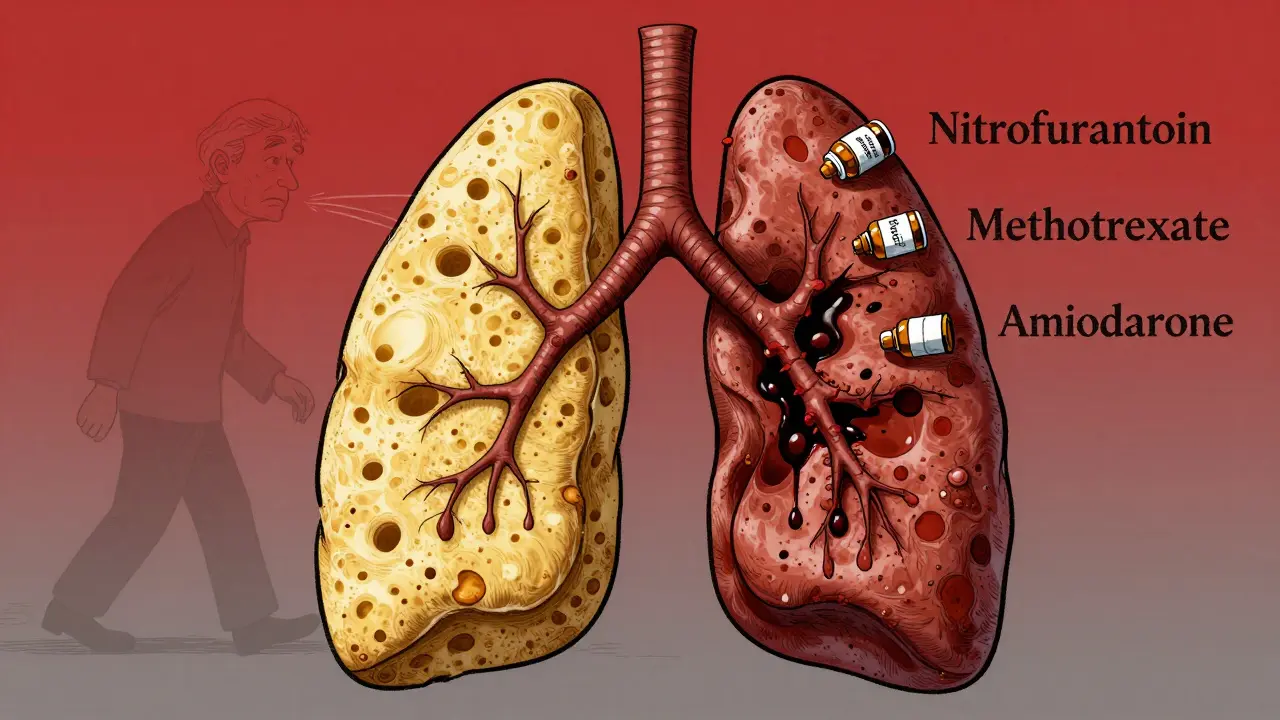
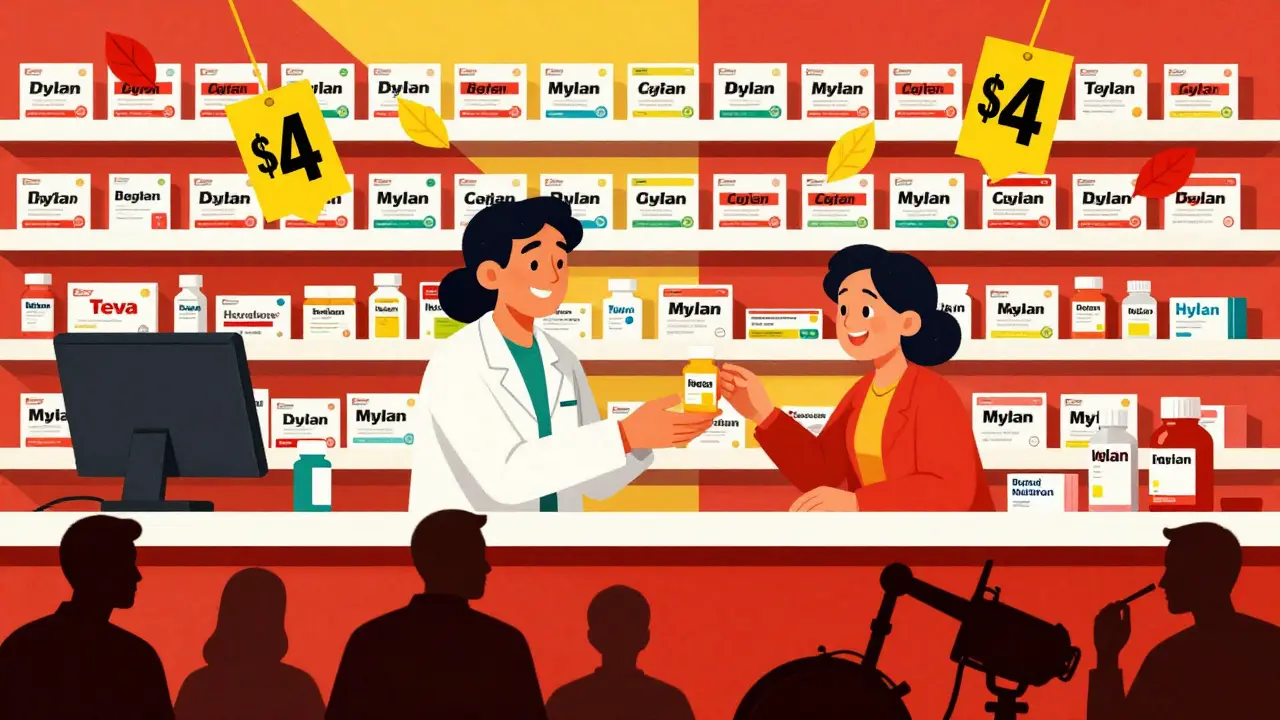
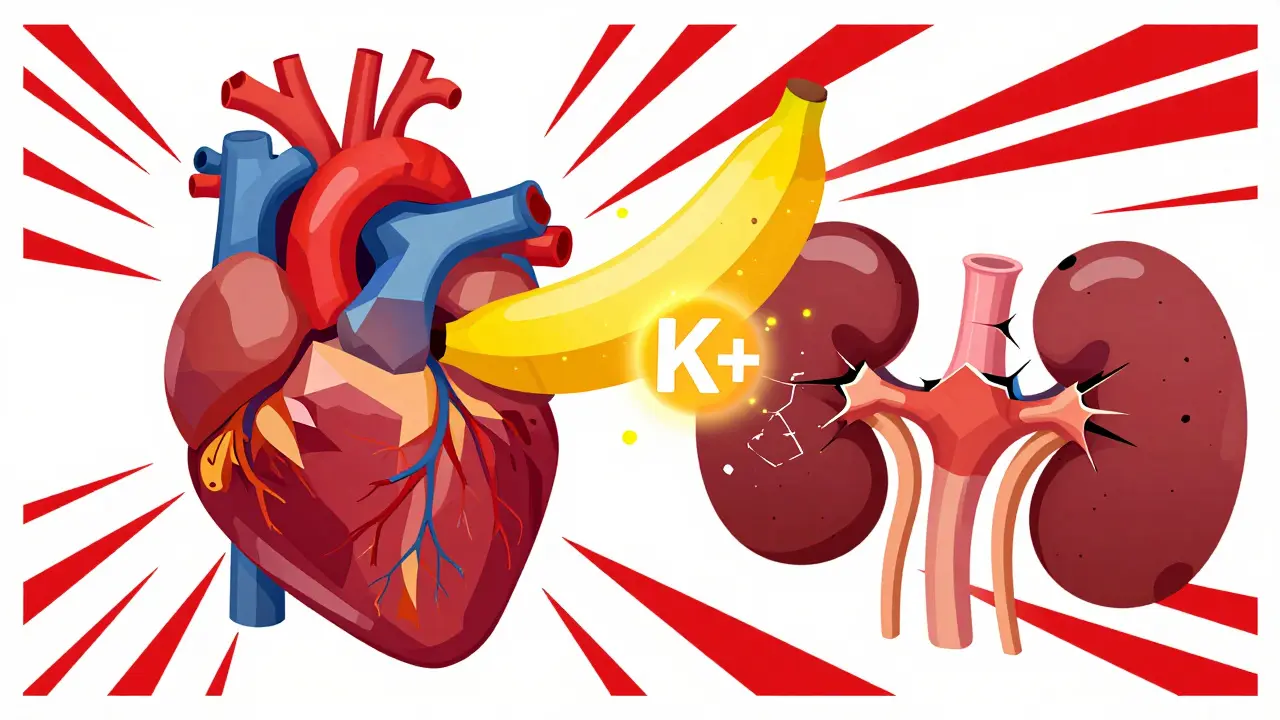
Delilah Jones
September 4, 2024 AT 17:14Stumbled across the breakdown of how smoking wrecks the immune system and it’s a solid reminder: the body isn’t a rubber band you can stretch forever. Every puff chips away at the white‑blood‑cell squad, making you a sitting target for every bug that comes knocking. If you’re already feeling the drag, pull the plug now and give those defenders a fighting chance.
Pastor Ken Kook
September 7, 2024 AT 00:47Wow, the article really nails the science behind nicotine’s assault on T‑cells and B‑cells. It’s wild how even a few cigarettes can start a cascade of inflammation that hangs around like an unwanted houseguest. The good news? Your body starts patching things up almost immediately after you quit 😌
Keep those facts handy, they’re gold when you’re trying to convince a friend to ditch the habit.
Jennifer Harris
September 9, 2024 AT 08:21Smoking basically puts your immune system on a permanent coffee break.
Northern Lass
September 11, 2024 AT 15:54One must, with a modicum of scholarly decorum, acknowledge the veritable onslaught that tobacco constituents wreak upon the immune architecture. The deleterious symphony of nicotine, carbon monoxide, and tar orchestrates an insidious erosion of both innate and adaptive defenses, rendering the host exquisitely vulnerable. Permit me to articulate that the attenuation of ciliary motility and the perturbation of lymphocyte viability constitute a veritable travesty of physiological harmony. Moreover, the chronic oxidative stress precipitates a cascade of cytokine dysregulation, fostering an environment ripe for autoimmune aberrations. In summation, the empirical corpus unequivocally substantiates the assertion that tobacco smoke is an egregious antagonist of immunological vigor.
Johanna Sinisalo
September 13, 2024 AT 23:27Great rundown! If you’re on the fence, remember that quitting not only bolsters your immune system but also improves circulation and skin health. A practical tip: set a quit date, notify friends for support, and replace cravings with short walks or a new hobby. Small steps lead to big gains – you’ve got this.
OKORIE JOSEPH
September 16, 2024 AT 07:01Smoking kills your immune system you should stop now it’s obvious you’re just feeding the addiction and letting germs in
Lucy Pittendreigh
September 18, 2024 AT 14:34Honestly this article just repeats the same tired warnings you see on every pack they think we’re not smart enough to figure out smoking is bad but here we are reading another lecture on why nicotine is evil
Nikita Warner
September 20, 2024 AT 22:07From a clinical perspective, the data presented aligns with established immunological research. The suppression of alveolar macrophage activity and the reduction in IgG production are well‑documented phenomena. For patients contemplating cessation, it is advisable to pursue nicotine replacement therapy under medical supervision to mitigate withdrawal while allowing immune recovery.
Liam Mahoney
September 23, 2024 AT 05:41Yo man the boddy gets inflammed fr a crumb of smoke its like a wobow of immune sysytem i can see it from th e data it’s simple – quit or die
surender kumar
September 25, 2024 AT 13:14Oh, look, another piece telling us smoking is bad. Shocking, right? I mean, who would have thought that inhaling a chemical cocktail would impair your body's defense squad? Yet here we are, reminded in glorious detail that #SmokingSucks. Thanks for the groundbreaking insight, really.
Justin Ornellas
September 27, 2024 AT 20:47Let’s get this straight: the grammar in the article is flawless, but the biology isn’t a grammar lesson. Smoking introduces toxins that oxidize cellular components, diminishing the efficacy of neutrophils and suppressing cytokine signaling pathways. In lay terms, you’re basically handing germs a VIP pass. So, if you cherish proper punctuation, you’ll also cherish a properly functioning immune system – quit the smoke.
JOJO Yang
September 30, 2024 AT 04:21Okay, drama alert! Picture this: you’re a superhero, cape fluttering, immune cells ready to pounce. Then *boom*-a cigarette smokes in, and your powers go poof! It’s like watching your favorite TV show get cancelled mid‑season-utterly tragic. Quit now and bring the drama back on stage, not in your lungs.
Faith Leach
October 2, 2024 AT 11:54Wake up, folks! The tobacco industry is a front for a global agenda to weaken our immune defenses and keep us dependent on pharmaceutical fixes. Every inhale is a silent betrayal of our nation’s health sovereignty. Stand up, reject the smoke, and protect your bloodline’s vigor.
Eric Appiah Tano
October 4, 2024 AT 19:27In many cultures, community support plays a pivotal role in quitting smoking. Pair your cessation plan with group activities-perhaps a weekly dance class or a cooking workshop-to replace nicotine cravings with positive social interaction. Remember, the journey is easier when you have allies cheering you on.
Jonathan Lindsey
October 7, 2024 AT 03:01Let us, with the utmost gravitas, examine the multitudinous ramifications of tobacco consumption on the venerable bastion we term the immune system. To commence, the inhalation of combusted leaf material inundates the pulmonary epithelium with a plethora of noxious agents, each clamoring to subvert the delicate equilibrium of host defence. The immediate consequence is a pronounced attenuation of ciliary motility; these microscopic vanguards, once diligent in sweeping away pathogens, become despondent and ineffective. Moreover, the alveolar macrophages, those tireless phagocytes, find their phagocytic aptitude diminished, rendering the alveolar spaces a veritable banquet for opportunistic microbes.
Yet the perniciousness does not halt at the respiratory frontier. Nicotine, that capricious alkaloid, orchestrates a cascade of systemic inflammation, prompting an overproduction of pro‑inflammatory cytokines whilst simultaneously stifling the synthesis of anti‑inflammatory mediators. This dysregulated cytokine milieu precipitates a chronic, low‑grade inflammatory state, a condition wherein the immune system is perennially “on‑call” yet paradoxically impaired.
Consequently, the adaptive arm of immunity-characterized by the orchestrated actions of T‑lymphocytes and B‑lymphocytes-suffers. The proliferation and differentiation of naïve T‑cells within the thymus are curtailed, a phenomenon corroborated by longitudinal studies indicating a reduced naïve‑to‑memory T‑cell ratio among chronic smokers. B‑cell maturation, tasked with antibody production, is similarly hindered, culminating in suboptimal seroconversion following vaccination.
One cannot overlook the impact on hematopoiesis; carbon monoxide, a chief constituent of cigarette smoke, exhibits a higher affinity for hemoglobin than oxygen, thereby engendering tissue hypoxia. This hypoxic stress begets erythropoietic compensation, whilst simultaneously depriving immune cells of the requisite oxygen for optimal function. The resultant anemic milieu further debilitates the host’s defensive posture.
In summation, the tableau painted by empirical inquiry is incontrovertible: smoking engenders a multifaceted assault on both innate and adaptive immunity, eroding the very foundations of physiological resilience. The salutary implication is clear-cessation of tobacco use catalyzes a cascade of reparative processes, restoring mucociliary clearance, normalizing cytokine balance, and rejuvenating lymphocyte function. Thus, to safeguard one’s immunological fortitude, the most judicious course of action is the unequivocal abandonment of smoking, thereby granting the body the latitude to reclaim its innate vigor.